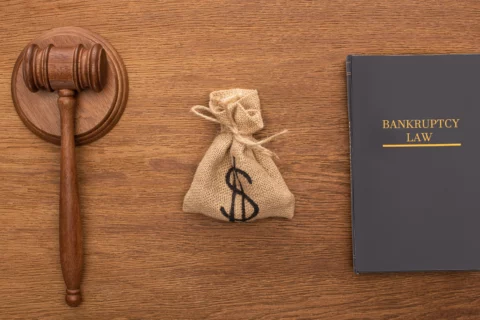Debts That Survive Chapter 13 Bankruptcy in Illinois
Manage Bankruptcy and Embrace a Debt-Free Future with Legal Help
Filed for Chapter 13 bankruptcy and still struggling with debt? You are not alone. Many people who file for Chapter 13 still have debts that survive Chapter 13 bankruptcy. These debts can be a heavy burden, both financially and emotionally.
At Cutler & Associates, Ltd., in Aurora, IL, we understand the challenges individuals with debts that survive Chapter 13 bankruptcy in Illinois face. Our team of experienced attorneys can help you develop a plan to manage your debt and get back on your feet. With our proven track record of success, we help clients manage their debt and get back on their feet. We are a compassionate and understanding firm that will take the time to listen to your concerns and develop an appropriate plan for you.
Quick Summary:
Here’s a brief overview of everything you need to know:
- Chapter 13 bankruptcy is a reorganization bankruptcy that allows individuals to create a repayment plan to pay off their debts over three to five years.
- Some debts survive Chapter 13 bankruptcy, including student loans, fraudulent debts, domestic support obligations, debts arising from willful or malicious actions, debts or creditors you do not list, criminal penalties, certain taxes, intoxicated driving debts, and huge fines or penalties owed to a government agency.
- A law firm focusing on bankruptcy can help you develop a personalized debt management plan, negotiate with creditors for favorable terms, and protect your assets and credit score if you are overwhelmed by debts that survive Chapter 13 bankruptcy.
So, what are you waiting for? Visit our website or call us today to schedule a free consultation with one of our competent attorneys. We can help you get the relief you need and start anew.
What is Chapter 13 Bankruptcy?
Chapter 13 bankruptcy is a reorganization bankruptcy, which means the debtor creates a repayment plan to pay off their debts over three to five years. Together with our knowledgeable Chapter 13 bankruptcy lawyer, we will assist you in making regular payments and retaining most of your present belongings.
A person filing under Chapter 13 bankruptcy must pay a trustee in bankruptcy each month as part of this reorganization filing. The trustee is responsible for collecting money and paying your creditors back following a Chapter 13 repayment. Your disposable income is one of many elements that determine the plan.
In addition, Chapter 13 provides people with several benefits over Chapter 7 or liquidation bankruptcy. Chapter 13 bankruptcy lets people prevent their houses from going into foreclosure. Individuals may halt foreclosure proceedings by filing under this chapter, and they may eventually cure past-due mortgage payments with payments made under the terms of the Chapter 13 plan.
What are the Debts That Survive Chapter 13 Bankruptcy in Illinois?
Some debts survive Chapter 13 bankruptcy, regardless of your income or situation, even upon fulfilling your Chapter 13 plan. You must obtain legal counsel from our renowned bankruptcy attorney at Cutler & Associates, Ltd. if you are contemplating filing for Chapter 13 bankruptcy. We can explain the parameters of the bankruptcy discharge.
Student Loans
Chapter 13 bankruptcy typically does not discharge student loans or government-guaranteed educational debt. If the court determines that repaying the debt will place an unreasonable burden on the debtor and their dependents, they might be released from repayment.
Fraudulent Debts
Fraud, theft, and any related to breach of fiduciary duty is a nondischargeable debt in Chapter 13 bankruptcy. This debt will only be discharged if the creditor fails to appear in court and prove the deception.
Domestic Support Obligation
Debts that meet the following criteria and are incurred either before or after bankruptcy are considered domestic support obligations:
- They are alimony, child support, or maintenance by definition.
- They are owed to the government, your child, your spouse, or both.
- A property settlement agreement, divorce decree, separation agreement, court order, or administrative resolution should all contain the requirement.
Both Chapter 7 and Chapter 13 bankruptcy do not allow you to discharge debts related to child support and alimony that you owe to an ex-spouse or child directly. It will also cover the whole amount of your payback schedule.
Debts Coming From Your Willful or Malicious Actions
A judgment rendered against the creditor in a civil court will not be discharged if the judgment is for death or physical harm brought on by deliberate or malicious actions. Malicious and willful refers to intentional and unjustified behavior. Note that Chapter 13, which significantly broadens the categories of debt that will survive discharge, merely requires the act giving rise to the debt to be malicious or willful for it to be non-dischargeable.
Debts or Creditors You Do Not List
Debts that are not included in a Chapter 13 case typically survive bankruptcy. When filing for bankruptcy, you must cover all your creditors and their most recent addresses. Nevertheless, the court will not inform the creditor if you neglect to include them on your bankruptcy paperwork or if you knowingly provide false information about their identity or address, and the debt will virtually always remain after your bankruptcy.
Criminal Penalties
Considerable penalties and court costs associated with criminal proceedings are often non-dischargeable when imposed on debtors as a penalty for their offenses. You are not eligible for Chapter 13 discharge for debts related to fines or restitution orders that were part of your sentencing if you were found guilty of any felony.
Certain Taxes
Debts that first became due within three years before your filing date are considered recent income tax debts. These debts are regarded as priority debts. In any Chapter 13 plan, they have to be paid in full.
The outstanding tax debts will not be discharged if your Chapter 13 concludes early, for whatever reason. In this case, you must pay them out of pocket or change your Chapter 13 bankruptcy to a Chapter 7 bankruptcy.
Intoxicated Driving Debts
Any debt resulting from an injury sustained while operating a vehicle and illegally inebriated by drugs or alcohol is not dischargeable. The judgment against you will not be released if the bankruptcy court finds you were intoxicated.
Only personal injuries are covered under this provision. You might get your debts for property damage from your drunk driving dismissed.
Hefty Fines or Penalties Owed to a Government Agency
Chapter 13 bankruptcy will not discharge debt subject to a seizure of property, penalty, or punishment imposed by a government agency. Only the fine may not be discharged in certain circumstances, such as when the government agency imposes the penalty. You were overpaid benefits because you neglected to disclose your income or for other improper conduct. The overpayment amount is dischargeable in the same way as any unsecured debt. The court may decide that the overpayment is not dischargeable if the government agency files a lawsuit claiming that you received the excess money through deception.
Contact Our Law Firm and Let Us Help You Navigate the Path to Financial Stability
Are you overwhelmed by debts that survive Chapter 13 bankruptcy in Illinois? Cutler & Associates, Ltd. can help you regain control. Navigating the complexities of debt management after Chapter 13 bankruptcy can be daunting. At Cutler & Associates, Ltd., we understand your emotional and financial strain. Our experienced attorneys are committed to providing comprehensive guidance and support to achieve financial freedom.
We are dedicated to helping individuals like you:
- Identify and manage debts that survived Chapter 13 bankruptcy
- Develop a personalized debt management plan
- Negotiate with creditors for favorable terms
- Protect your assets and credit score
Do not let lingering debt dictate your future. We are here to allow you to take control of your finances and reclaim your peace of mind. Call us now or visit our website to schedule a free consultation and experience the difference. Aside from Aurora, we provide bankruptcy services to Schaumburg, Oakbrook Terrace, and Skokie.


